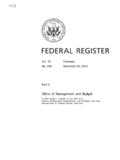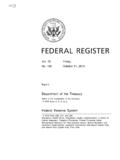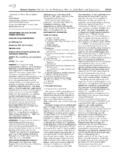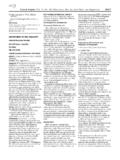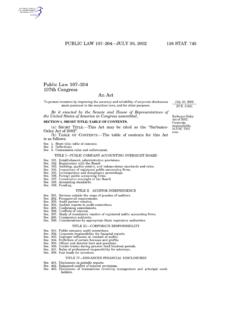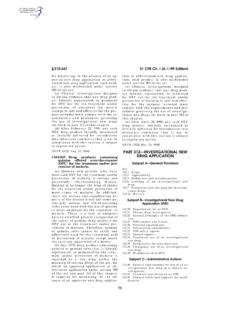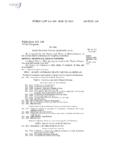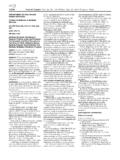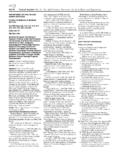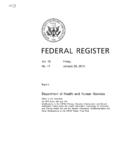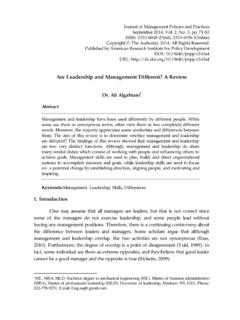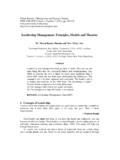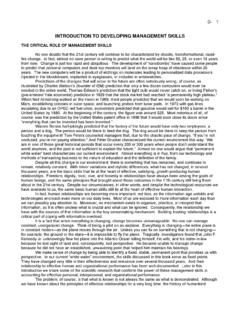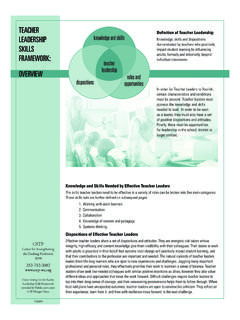Transcription of Management Competencies Assessment Instrument. A ...
1 ED 465 077 DOCUMENT RESUME CE 083 334 AUTHOR TITLE INSTITUTION SPONS AGENCY PUB DATE NOTE AVAILABLE FROM PUB TYPE EDRS PRICE DESCRIPTORS IDENTIFIERS ABSTRACT Sherman, Renee; Dobbins, Dionne; Tibbetts, John; Crocker, Judith; Dlott, Michael Management Competencies Assessment Instrument. A Publication of Building Professional Development Partnerships for Adult Educators Project. PRO-NET 2000. American Institutes for Research, Washington, DC. Office of Vocational and Adult Education (ED), Washington, DC. Div. of Adult Education and Literacy. 95p.; Jim Parker was the Project Officer. For full text: ~ Reports - Descriptive (141) -- Tests/Questionnaires (160) MFOl/PCO4 Plus Postage. Administrator Effectiveness; Administrator Qualifications; Administrator Selection; *Administrators; *Adult Education; Adult Programs; Competence; *Competency Based Education; Instrumentation; Job Performance; *Job skills ; * Management Development; *Mastery Tests; Minimum Competency Testing; Professional Development; Program Improvement; Test Construction; Test Use Administrator Competencies 2002-03-00 This publication introduces an Assessment instrument to help programs implement Management Competencies .
2 It discusses development of Management Competencies and describes the Management Competencies Assessment Instrument (MCAI) designed to help managers verify and validate their Competencies and use the information for planning professional development and improving programs. (Based on 21 Competencies identified in Management Competencies and Sample Indicators for the Improvement of Adult Education Programs (MCSI), MCAI mirrors the format of the Management Competencies . The first skill area corresponds to the first competency in MCSI. Associated indicators are listed under each competency and rated on a four-point scale from 1--Needs Assistance through 4--Exemplary; additional choices are Not Applicable and Don't Know. The publication provides an overview of types of evidence (performance evaluations, administrative reports, and portfolios) verifying existence of a competency, since in addition to the rating scale for each indicator, the format provides space for the evaluator to record supporting evidence comments.)
3 These MCAI uses are discussed: needs Assessment , planning for and evaluating professional development, hiring, retention and dismissal, program evaluation, facilitating communication, and systemic change. Appendixes to the 17-page report are MCSI, MCAI with administration instructions, and summary profile for Management Competencies . ( YLB 1 Reproductions supplied by EDRS are the best that can be made I fiom the original document. A Publication of Building Professional Development Partnerships for Adult Educators Project PRO-NET 2000 March 2002 DEPARTMENT OF EDUCATION ' Office of Educalional Research and lrnpro~ement CENTER (ERIC) This document has been reproduced as ceived from the Derson or oraanization RESOURCES INFORMATION Y originating it. ' 0 Minor changes have been made to improve reproduction quality. Points of view or opinions stated in this document do not necessarily represent official OERl position or policy.)
4 ~ / Renee Sherman Dionne Dobbins John Tibbetts Judith Crocker Michael Dlott American lnstitutes for Research Sponsored by: Department of Education Division of Adult Education and Literacy Jim Parker, Project Officer 2 Table of Contents Pages Introduction .. 1 Development of Management Competencies .. 3 The Management Competencies Assessment Instrument .. 4 Competency Evidence .. 6 Uses ofthe Management Competencies Assessment Instrument .. 9 Summary .. 16 Appendices A . Management Competencies and Sample Performance Indicators .. A- 1 B . Management Competencies Assessment Instrument .. B-1 C . Summary Profile for Management Competencies .. C-1 Featured in this publication are: . A description of the Management Competencies Assessment Instrument (MCAI) An overview of the types of evidence verifying the existence of a competency A discussion of the uses of the MCAI A template of the instrument = Purposes of the Management Competencies : To foster reflective thinking among adult education administrators about their programs areas for improvement for themselves and for their programs.
5 1 To help administrators plan and implement strategies that enhance the overall quality of their programs . To identify areas of strength and INTRODUCTION There is increasing emphasis on improving quality and demonstrating accountability in the field of adult education. In the past, much of this emphasis focused on the Assessment of instructor quality and learner outcomes. However, performance by instructors and learners depends, in part, on the resources available, the environment in which the program operates, and the level of support received from program administrators. Therefore, quality adult education programs need administrators of the highest caliber. Administrators are being called on to prove their competence in many areas. Among the challenges faced by administrators in adult education are: securing and allocating resources to address competing priorities; developing and promoting the organization s mission, goals, and objectives; making increasingly complex technology accessible; meeting the needs of a diverse student population; employing and supervising an ever- changing instructional staff; initiating and advocating changes that promote program improvement; advocating for the field of adult education; responding to the changing demands for program accountability; encouraging problem solving and team building among staff; and collaborating with other agencies and stakeholders to provide comprehensive delivery of services.
6 One of the major goals of Building Professional Development Partnerships for Adult Educators (PRO-NET 2000), an American Institutes for Research project funded by the United States Department of Education, Division of Adult Education and Literacy, is to provide the field with a national model of Competencies that can be supported by research. PRO-NET initially focused on instructor Competencies and, on the basis of research, prepared a publication that identifies these Competencies and their uses. Instructor Competencies and Performance Indicators for the Improvement of Adult Education Programs' is being used by a variety of adult education stakeholders-state and local administrators, professional development coordinators, and instructors-to identify instructor Competencies , plan for professional development, enhance instructor performance, and improve program quality. However, instruction does not occur in a vacuum, and the field strongly recommended that PRO-NET develop Competencies for administrators in adult education.
7 Management Competencies and Sample Indicators I I for the Improvement of Adult Education Programs2 The Management Competencies reflect seven broadly defined categories: 1 leadership skills 1 Instructional leadership 1 Resource Management and 1 Staff Supervision 1 Program Monitoring and 1 Professional Development Community Collaboration Allocation Reporting Practices identifies, through research, a set of recognized skills and knowledge areas that effective program administrators possess. Support for Management Competencies exists at the state and local level for several reasons: . Competencies provide a basis for needs assessments to help programs identify areas for program improvement.. States can use the PRO-NET Management Competencies to build on existing state Competencies or to develop additional Competencies that are consistent with their state goals and needs.. State and local programs can use the Competencies and related performance indicators as a basis for adult education certification and credentialing for program managers.
8 ' This Pro-Net 2000 publication is available at ibid. 2 5 Development of Management Competencies Sample Competencies : PRO-NET 2000 followed the same field-based research approach for developing the Management Competencies as it did for developing instructor Competencies . This approach included an extensive review of the Management literature, field surveys, focus groups, and reviews by experts in the field. PRO-NET 2000 identified shlls, behaviors, and practices that characterize effective Management skills . Like the instructor Competencies , the Management Competencies were developed to reflect the Secretary s Commission on Achieving Necessary skills (SCANS) 1 Demonstrates effective interpersonal and communication skills . research on the definition of effective job performance. For example, the Competencies emphasize interpersonal skills , 1 Effectively manages and allocates the budget. 1 Recruits, hires, evaluates, and terminates staff based on established criteria.
9 Such as being an attentive listener and a good communicator, being approachable and accessible to staff, respecting diversity, and considering differences in opinion I among staff members when making decisions. The . Promotes continuous professional development for staff. Competencies also focus on the effective Management and allocation of resources, ongoing program evaluation, and outcome reporting for program improvement and accountability consistent with the Workforce Investment Act (WIA) and other legislation. Throughout, the Competencies emphasize the use of technology. Performance indicators operationally define each competency. These performance indicators identify skills , , or practices that demonstrate the existence of the competency. Performance indicators are meant to serve as exemplars and are not exhaustive. The Competencies and performance indicators appear in Appendix A. 3 6 The Management Competencies Assessment Instrument This publication introduces an Assessment instrument to help programs implement the Management Competencies .
10 What follows is a detailed description of the Management Competencies Assessment Instrument (MCAI), including an overview of the various types of evidence that will help verify of the existence of the Competencies . Also included in this document are suggestions for using the Assessment instrument, as well as a template of the instrument. PRO-NET also developed a companion instrument, The Instructor Competencies Assessment Instrument (ICAI), to assess instructor attainment of Competencies . PRO-NET developed the ICAI in response to the assertion that learner outcomes may be enhanced when programs document and account for instruction. Managers interested in program improvement will find it useful to use both instruments . Later in this document, program managers will learn how they can use these instruments together to facilitate communication between and among staff and to plan for program improvement. The Management Competencies Assessment Instrument (MCAI) in Appendix B is designed to help managers verify and validate their Competencies and to use the information for planning professional development and improving programs.
